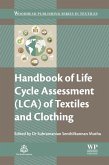The book begins by detailing European and US legislation relating to textile dyeing. Further chapters cover toxicology, environmentally responsible application of dyes and supercritical fluid textile dyeing. The book concludes with chapters on the reduction of pollution and minimisation of waste, the re-use of spent dyebath, chemical treatment of dye effluent and biotechnological treatment of dye effluent.
Environmental aspects of textile dyeing is a standard reference source for manufacturers concerned with developing a sustainable industry.
- Crucial guide to minimising harmful effects on environment and the consumer
- Reviews current technologies and European and US legislation
- Essential for all textile manufacturers
Dieser Download kann aus rechtlichen Gründen nur mit Rechnungsadresse in A, B, BG, CY, CZ, D, DK, EW, E, FIN, F, GR, HR, H, IRL, I, LT, L, LR, M, NL, PL, P, R, S, SLO, SK ausgeliefert werden.









